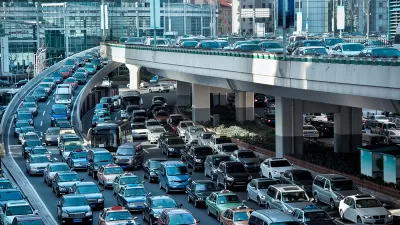In a policy analysis for the Cato Institute, Randal O'Toole reviews plans for more than 75 of the nation's largest metropolitan areas reveals that virtually all of them fail to follow standard planning methods, and half of them are not effective.
Randall O'Toole find that nearly half the 75 plans reviewed for his analysis are "not cost effective in meeting transportation goals. These plans rely heavily on behavioral tools such as land-use regulation, subsidies to dense or mixed-use developments, and construction of expensive rail transit lines. Nearly 40 years of experience with such tools has shown that they are expensive but provide negligible transportation benefits.
Long-range transportation planning necessarily depends on uncertain forecasts. Planners also set qualitative goals such as 'vibrant communities' and quantifiable but incomparable goals such as 'protecting historic resources.' Such vagaries result in a politicized process that cannot hope to find the most effective transportation solutions. Thus, long-range planning has contributed to, rather than prevented, the hextupling of congestion American urban areas have suffered since 1982."
From the conclusion of the analysis:
"It comes down to this: Government planners can't accurately predict what future generations
will want or need, yet long-range transportation plans can lock agencies into plans and projects that make no sense. Twenty years ago no one predicted that the Internet would lead telecommuters to outnumber
transit riders in the vast majority of urban areas, or that intercity bus service (driven by online ticket sales) would be growing for the first time in decades, or that FedEx, UPS, and DHL would be making daily deliveries of online purchases on almost every residential street in America. Just as plans written 20 years ago would be wrong about those things today, plans written today for 20 years from now will also be wrong.
In short, any long-range plan is guaranteed to be wrong. Yet, as Drucker observed, that fact that it is a government plan makes it is very hard to change. That means long range transportation plans are locking more and more urban areas into dubious programs of increased congestion (in the hope of discouraging a few vehicle miles of travel), unaffordable housing (in the hope of encouraging a few more people to crowd into transit-oriented developments), and costly rail projects the environmental and transportation benefits of which are dubious at best."
Thanks to Peter Gordon
FULL STORY: Roadmap to Gridlock: The Failure of Long-Range Metropolitan Transportation Planning

Alabama: Trump Terminates Settlements for Black Communities Harmed By Raw Sewage
Trump deemed the landmark civil rights agreement “illegal DEI and environmental justice policy.”

Planetizen Federal Action Tracker
A weekly monitor of how Trump’s orders and actions are impacting planners and planning in America.

The 120 Year Old Tiny Home Villages That Sheltered San Francisco’s Earthquake Refugees
More than a century ago, San Francisco mobilized to house thousands of residents displaced by the 1906 earthquake. Could their strategy offer a model for the present?

LA’s Tree Emergency Goes Beyond Vandalism
After a vandal destroyed dozens of downtown LA trees, Mayor Karen Bass vowed to replace them. Days later, she slashed the city’s tree budget.

Sacramento Leads Nation With Bus-Mounted Bike Lane Enforcement Cameras
The city is the first to use its bus-mounted traffic enforcement system to cite drivers who park or drive in bike lanes.

Seattle Voters Approve Social Housing Referendum
Voters approved a corporate tax to fund the city’s housing authority despite an opposition campaign funded by Amazon and Microsoft.
Urban Design for Planners 1: Software Tools
This six-course series explores essential urban design concepts using open source software and equips planners with the tools they need to participate fully in the urban design process.
Planning for Universal Design
Learn the tools for implementing Universal Design in planning regulations.
Ada County Highway District
Clanton & Associates, Inc.
Jessamine County Fiscal Court
Institute for Housing and Urban Development Studies (IHS)
City of Grandview
Harvard GSD Executive Education
Toledo-Lucas County Plan Commissions
Salt Lake City
NYU Wagner Graduate School of Public Service




























